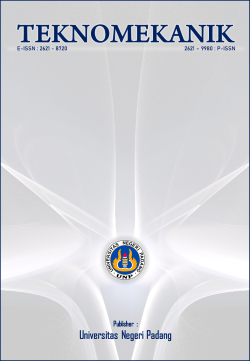Waste motor engine oil – the influence in warm mix asphalt
DOI:
https://doi.org/10.24036/jptk.v6i4.34623Keywords:
Responsible consumption and production, Waste motor engine oil, Warm mix asphalt, Stability, Penetration, Softening pointAbstract
Employing Hot Mix Asphalt (HMA) technology for asphalt pavement construction results in the emission of greenhouse gases and other harmful pollutants, contributing to significant air pollution due to extensive energy consumption. Consequently, the adoption of Warm Mix Asphalt (WMA) is recommended, given its potential for enhanced energy efficiency and reduced emissions due to lower mixing and production temperatures compared to HMA. This research delves into the impact of incorporating waste motor engine oil (WMEO) as a bitumen modifier in warm mix asphalt. The investigation involved adding WMEO at various percentages, specifically 0%, 3%, 4%, and 5% based on the weight of bitumen. The study assessed the performance of the samples in terms of penetration, softening point, stability, flow, and stiffness. The findings revealed that the incorporation of WMEO in warm mix asphalt led to a substantial improvement in penetration and softening point. Moreover, the results indicated that incorporating WMEO as a bitumen modifier could enhance the performance of WMA in terms of stability, flow, and stiffness.
Downloads
References
Abdullah, M. E., Zamhari, K. A., Buhari, R., Khatijah, S., Bakar, A., Hidayah, N., Kamaruddin, M., Nayan, N., Hainin, R., Hassan, N. A., Hassan, S. A., Izzi, N., & Yusoff, M. (2014). Jurnal Teknologi Warm Mix Asphalt Technology: A Review. www.jurnalteknologi.utm.my
Al-Ghouti, M. A., & Al-Atoum, L. (2009). Virgin and recycled engine oil differentiation: A spectroscopic study. Journal of Environmental Management, 90(1), 187–195. https://doi.org/10.1016/j.jenvman.2007.08.018
ASTM D5. (2013). D5/D5M-20 Standard Test Method for Penetration of Bituminous Materials. In West Conshohocken, PA.
ASTM D36. (2014). Standard Test Method for Softening Point of Bitumen (Ring-and-Ball Apparatus). Manual on Hydrocarbon Analysis, 6th Edition. https://doi.org/10.1520/mnl10830m
ASTM D5581. (2007). Standard Test Method for Resistance to Plastic Flow of Bituminous Mixtures using Marshall Apparatus, ASTM International, West Conshohocken, PA. American Society for Testing and Materials.
Eleyedath, A., & Swamy, A. K. (2020). Use of waste engine oil in materials containing asphaltic components. In Eco-efficient Pavement Construction Materials (pp. 33–50). Elsevier Inc. https://doi.org/10.1016/B978-0-12-818981-8.00003- 5
El-Shorbagy, A. M., El-Badawy, S. M., & Gabr, A. R. (2019). Investigation of waste oils as rejuvenators of aged bitumen for sustainable pavement. Construction and Building Materials, 220, 228–237. https://doi.org/10.1016/j.conbuildmat.2019.05.180
Fernandes, S., Peralta, J., Oliveira, J. R. M., Williams, R. C., & Silva, H. M. R. D. (2017). Improving asphalt mixture performance by partially replacing bitumen with waste motor oil and elastomer modifiers. Applied Sciences (Switzerland), 7(8). https://doi.org/10.3390/app7080794
Jia, X., Huang, B., Moore, J. A., & Zhao, S. (2015). Influence of Waste Engine Oil on Asphalt Mixtures Containing Reclaimed Asphalt Pavement. Journal of Materials in Civil Engineering, 27(12). https://doi.org/10.1061/(asce)mt.1943-5533.0001292
Maceiras, R., Alfonsín, V., & Morales, F. J. (2017). Recycling of waste engine oil for diesel production. Waste Management, 60, 351–356. https://doi.org/10.1016/j.wasman.2016.08.009
Mamun, A. A., & Al-Abdul Wahhab, H. I. (2018). Evaluation of Waste Engine Oil-Rejuvenated Asphalt Concrete Mixtures with High RAP Content. Advances in Materials Science and Engineering, 2018. https://doi.org/10.1155/2018/7386256
Qurashi, I. A., & Swamy, A. K. (2018). Viscoelastic properties of recycled asphalt binder containing waste engine oil. Journal of Cleaner Production, 182, 992–1000. https://doi.org/10.1016/j.jclepro.2018.01.237
Rose, A. A., Lenz, I. R., Than, C. T., & Glover, C. J. (2016). Investigation of the effects of recycled engine oil bottoms on asphalt field performance following an oxidation modeling approach. Petroleum Science and Technology, 34(21), 1768–1776. https://doi.org/10.1080/10916466.2016.1230753
Samsuddin, N., Idrus, M., & Masirin, M. (n.d.). Assessment of Road Infrastructures Pertaining to Malaysian Experience. https://doi.org/10.1051/C
Shafabakhsh, G. H., & Sajed, Y. (2014). Investigation of dynamic behavior of hot mix asphalt containing waste materials; case study: Glass cullet. Case Studies in Construction Materials, 1, 96–103. https://doi.org/10.1016/j.cscm.2014.05.002
Silva, H. M. R. D., Oliveira, J. R. M., Ferreira, C. I. G., & Pereira, P. A. A. (2010). Assessment of the Performance of Warm Mix Asphalts in Road Pavements. In International Journal of Pavement Research and Technology (Vol. 3, Issue 3).
Downloads
Published
How to Cite
Issue
Section
License
Copyright (c) 2023 Wan Noor Hin Mior Sani, Ramadhansyah Putra Jaya, Bunyamin Bunyamin, Zaid Hazim Al-Saffar, Yaumal Arbi

This work is licensed under a Creative Commons Attribution 4.0 International License.





